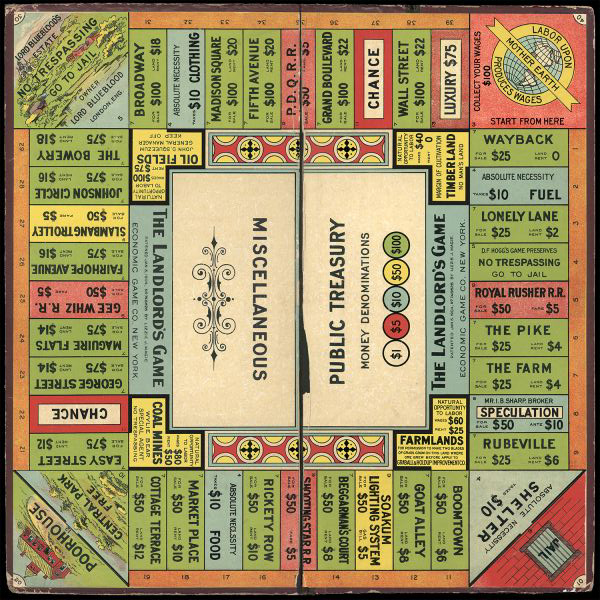Monopoly – a Vision Flipped
The history of how the game Monopoly flipped to contradict its original inventor’s vision provides a context to explore how Monopoly’s sequel, World Game, can fulfill its inventor’s vision, evolving into a Big Play to save Spaceship Earth, harnessing mobile computing, crowdsourcing, and collaborative tools.
The story of Monopoly starts in 1879 when Henry George published Progress and Poverty, a raging best-seller that sold three million copies. More than twenty years after Henry George’s book, Lizzie J. Magie (1866 – 1948), who was thirteen when Henry George published his bestseller, decided she could invent a game to revive interest in George’s ideas.
“The Landlord’s Game” became popular with Lizzie Magie’s friends, and she applied on March 23, 1903 for a patent on her board game [U.S. Patent 748,626 granted on January 5, 1904]. The game was designed for players to experience the harmful economic consequences of land monopolies. But Henry George’s big idea frightened the power elite: government should abolish taxes on wages and instead institute a “Single Tax” on property ownership. George believed that the policy his book advocated, if implemented, could eventually lead to collective ownership of all land. Alfred Russell Wallace, who with Charles Darwin co-discovered evolution, passed over Origin of Species to call Progress and Poverty the most important book of the century. Henry George’s idea raised a furor, was fiercely opposed by property owners, and ended in stalemate.Above: Lizzie Magie’s Game Board design of 1906, which was published by her company, the Economic Game Company. The game starts in the upper right-hand corner, on a square called “Mother Earth.”
Most of us imagine that Monopoly perfectly represents our conventional model of innovation. A single brilliant innovator makes an associative connection, has an aha moment, and presto! a new game is born. He files a patent, licenses his invention to Parker Brothers. The game becomes a hit, and lots of money is made. In this case, for Lizzie Magie, who devoted her life to this work, this presto! model is not what occurred.
Questions: How can the originators of an idea, who are its real champions, be better enabled, particularly when those originators are women? How can women receive a more equal percentage of venture capital funding? How can games address real problems, like homelessness and equity?
Zann Gill for earthDECKS


